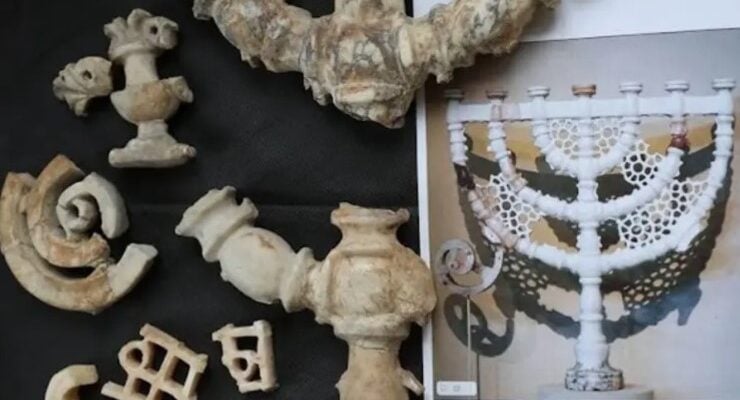The team also unearthed a tall ceramic vessel bearing a Hebrew seal reading ‘God: Justice,’ dated to the ninth or tenth century.
An unlikely archaeological project funded by a Russian oligarch has unearthed evidence of Jewish life so ancient it makes Vladimir Putin’s claims of Russian Orthodox dominance look like yesterday’s news.
Bankrolled by businessman Oleg Deripaska’s Volnoe Delo Foundation, a sprawling first-century Jewish quarter has emerged hidden beneath the soil of Phanagoria along the Black Sea.
The Jewish quarter sat at the intersection of two main streets in the city’s wealthiest district, complete with an irrigated garden where massive ceramic jars stored water for what might have been an orchard.
Among the most compelling finds are more than 200 Jewish gravestones, their surfaces still bearing witness to ancient craftsmen’s work.
The stones feature timeless Jewish symbols that would be familiar to any modern rabbi, such as a shofar, menorah, and delicately carved lulavim.
Yet it’s the marble tablets that have archaeologists buzzing. Dating to 16 and 51 CE, they record a practice of freeing slaves who earned their liberty by pledging continued service to the synagogue.
Carved in ancient Greek, the inscriptions mention both a “house of prayer” and a “synagogue,” proving Jewish religious life was firmly established here while Rome still ruled the Mediterranean.
Unfortunately, the synagogue itself met a violent end when sixth-century invaders stormed Phanagoria. Evidence of stone projectiles from siege weapons litters the site.
As for the congregation, they appear to have made a last stand in their house of worship, where excavators found 58 copper coins scattered in the shattered floor near the bimah and benches.
Eventually, the entire city was destroyed by invading forces, leaving Phanagoria abandoned for 130 years. When life finally returned to the ruins, it was under the banner of the Bosporan Kingdom.
Interestingly, the team also unearthed a tall ceramic vessel bearing a Hebrew seal reading “God: Justice,” dated to the ninth or tenth century.
Historian Larissa Golofast believes this artifact may link Phanagoria to the Radhanites, a term describing Jewish merchants who maintained vast trading networks during the early medieval period.
“The geographer Ibn Khordadbeh mentions four routes of the Radhanites. All of them began in Spain or France and ended in China. One of these routes passed through the territory of Khazaria. On their way from France and Spain, the Radhanites visited numerous centers, selling some items and buying others along the way,” Golofast tells Haaretz.
The discovery poses uncomfortable questions for Putin’s regime, which has staked its legitimacy partly on claims of Russia’s deep Orthodox Christian roots.
After Phanagoria’s destruction, Judaism would actually become the state religion in the region from the seventh to ninth centuries – a historical footnote that rarely makes it into official narratives.








